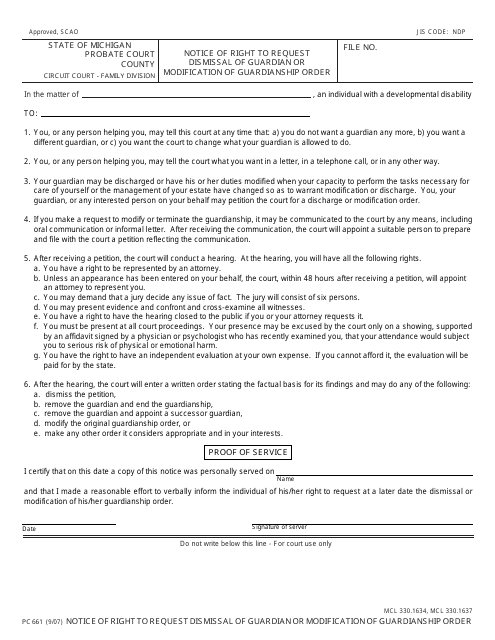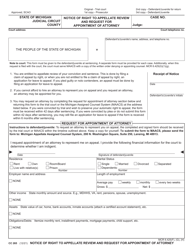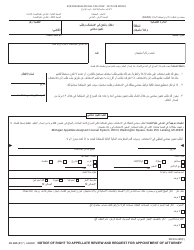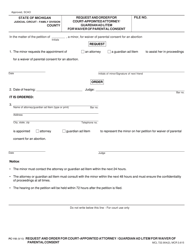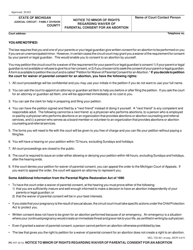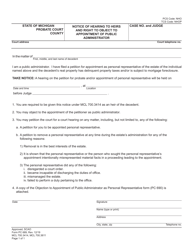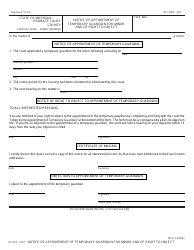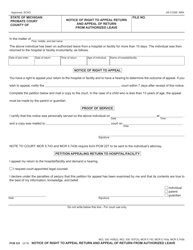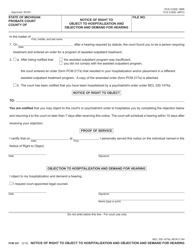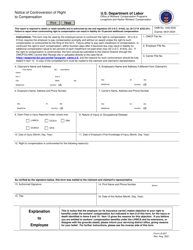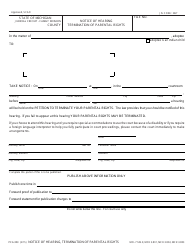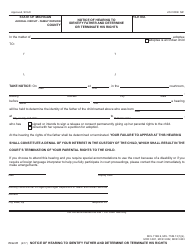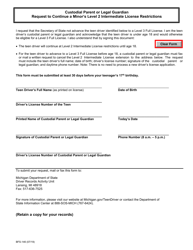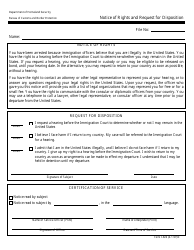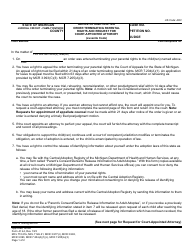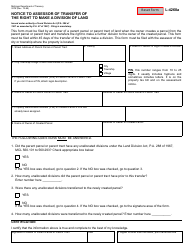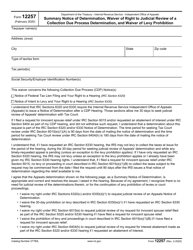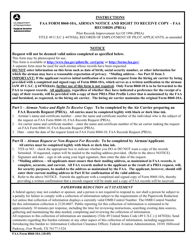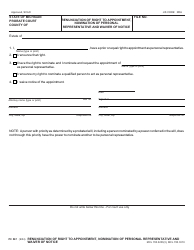Form PC661 Notice of Right to Request Dismissal of Guardian or Modification of Guardianship Order - Michigan
What Is Form PC661?
This is a legal form that was released by the Michigan Probate Court - a government authority operating within Michigan. As of today, no separate filing guidelines for the form are provided by the issuing department.
FAQ
Q: What is PC661 Notice of Right to Request Dismissal of Guardian or Modification of Guardianship Order?
A: PC661 is a legal form used in Michigan to notify parties in a guardianship case about the right to request dismissal of a guardian or modification of a guardianship order.
Q: Who can use PC661 Notice of Right to Request Dismissal of Guardian or Modification of Guardianship Order?
A: The PC661 form can be used by parties involved in a guardianship case in Michigan, including the ward or protected individual, the guardian, or any interested person.
Q: What is the purpose of PC661 Notice of Right to Request Dismissal of Guardian or Modification of Guardianship Order?
A: The purpose of the PC661 form is to inform parties in a guardianship case about their right to request the dismissal of a guardian or the modification of a guardianship order.
Q: How can someone request dismissal of a guardian or modification of a guardianship order?
A: To request dismissal of a guardian or modification of a guardianship order, the interested party must complete the PC661 form and file it with the appropriate court.
Q: What should I do if I have questions or need assistance with PC661 Notice of Right to Request Dismissal of Guardian or Modification of Guardianship Order?
A: If you have questions or need assistance with the PC661 form, it is best to consult with an attorney or contact the court handling the guardianship case for guidance.
Q: Is PC661 Notice of Right to Request Dismissal of Guardian or Modification of Guardianship Order specific to Michigan?
A: Yes, PC661 is a specific legal form used in guardianship cases in Michigan. Other states may have different forms and processes for requesting dismissal of a guardian or modification of a guardianship order.
Q: Is it mandatory to use PC661 Notice of Right to Request Dismissal of Guardian or Modification of Guardianship Order?
A: Using the PC661 form is not mandatory, but it is recommended to properly notify parties involved in a guardianship case about their right to request dismissal of a guardian or modification of a guardianship order.
Q: What are the consequences of filing PC661 Notice of Right to Request Dismissal of Guardian or Modification of Guardianship Order?
A: Filing the PC661 form does not guarantee the dismissal of a guardian or modification of a guardianship order. The court will review the request and consider relevant factors before making a decision.
Q: Can I request dismissal of a guardian or modification of a guardianship order without using PC661 Notice of Right to Request Dismissal of Guardian or Modification of Guardianship Order?
A: While using the PC661 form is recommended, you may still be able to request dismissal of a guardian or modification of a guardianship order through other means. It is advisable to consult with an attorney or contact the court for guidance on alternative procedures.
Q: What is a guardianship order?
A: A guardianship order is a legal document issued by the court that grants a person or entity the legal authority and responsibility to care for and make decisions on behalf of a ward or protected individual who is unable to care for themselves.
Q: Who is considered an interested person in a guardianship case?
A: An interested person in a guardianship case refers to anyone with a direct interest in the welfare of the ward or protected individual, including family members, caregivers, or other individuals who may be affected by the guardianship.
Q: What is the role of a guardian in a guardianship case?
A: A guardian is appointed by the court to act as a legal representative and decision-maker for a ward or protected individual. Their role is to ensure the well-being and best interests of the ward, making decisions regarding their personal and financial matters.
Q: Can a guardian be dismissed?
A: Yes, a guardian can be dismissed if there are valid reasons to do so. The court will consider the circumstances and evidence presented before making a decision on the dismissal of a guardian.
Q: What is the process for modifying a guardianship order?
A: The process for modifying a guardianship order involves filing a petition with the court, providing reasons for the proposed modification, and attending a hearing where the court will review the petition, consider evidence, and make a decision based on the best interests of the ward.
Q: Can the ward request dismissal of a guardian or modification of a guardianship order?
A: Yes, the ward or protected individual has the right to request dismissal of a guardian or modification of a guardianship order. The PC661 form can be used by the ward or their representative to initiate this process.
Q: What happens after filing PC661 Notice of Right to Request Dismissal of Guardian or Modification of Guardianship Order?
A: After filing the PC661 form, the court will review the request for dismissal or modification and may schedule a hearing to gather more information and make a decision. It is important to comply with any further instructions or requirements from the court.
Q: Can the guardian contest the request for dismissal or modification?
A: Yes, the guardian has the right to contest the request for dismissal or modification, and they may present evidence or arguments in support of their position during the court proceedings.
Q: What factors does the court consider when deciding on dismissal of a guardian or modification of a guardianship order?
A: The court considers factors such as the best interests of the ward, the capability of the guardian to fulfill their duties, the wishes of the ward if they can express them, and any evidence or arguments presented by the parties involved.
Q: How long does the process for dismissal or modification of a guardianship order typically take?
A: The duration of the process for dismissal or modification of a guardianship order can vary depending on the complexity of the case, the court's schedule, and other factors. It is best to consult with the court or an attorney for an estimate based on the specific circumstances.
Q: What if I need legal advice regarding a guardianship case?
A: If you need legal advice or assistance regarding a guardianship case, it is recommended to consult with an attorney who specializes in family law or guardianship matters. They can provide specific guidance based on your situation.
Q: What are the rights of the ward or protected individual in a guardianship case?
A: The rights of the ward or protected individual in a guardianship case vary depending on the circumstances and the court's orders. However, they generally retain certain basic rights such as the right to be treated with dignity, the right to receive appropriate care and support, and the right to express their preferences and opinions to the extent possible.
Q: Can I modify a guardianship order without filing a request for modification?
A: Modifying a guardianship order typically requires filing a request for modification with the court. It is advisable to follow the proper legal procedure to ensure validity and compliance.
Q: What do I do if I disagree with a guardianship order in Michigan?
A: If you disagree with a guardianship order in Michigan, it is advisable to consult with an attorney who can review the specific details of your case and guide you on the appropriate legal actions you can take, including filing a request for dismissal or modification if necessary.
Q: Can the court dismiss a guardianship without the request of the ward or interested person?
A: Yes, the court can dismiss a guardianship even without the request of the ward or an interested person, if it determines that the circumstances or evidence warrant such a decision. The court will review the case and make a decision based on the best interests of the ward.
Q: Can I appeal a decision regarding dismissal of a guardian or modification of a guardianship order?
A: Yes, if you disagree with a decision regarding dismissal of a guardian or modification of a guardianship order, you may have the right to appeal. It is recommended to consult with an attorney for guidance on the appeal process and requirements.
Q: What if I cannot afford an attorney for a guardianship case?
A: If you cannot afford an attorney for a guardianship case, you may be eligible for legal aid services or pro bono representation. Contact local legal aid organizations or the State Bar Association for information on resources available to individuals with limited financial means.
Q: What is the difference between dismissal and modification of a guardianship order?
A: Dismissal of a guardian involves terminating the appointment of the current guardian, while modification of a guardianship order entails making changes to the terms or conditions of the existing guardianship, such as altering the scope of the guardian's authority or responsibilities.
Q: Can I file PC661 Notice of Right to Request Dismissal of Guardian or Modification of Guardianship Order on behalf of someone else?
A: Yes, you can file the PC661 form on behalf of someone else, provided you have the legal authority or permission to act as their representative. It is recommended to consult with an attorney or the relevant court for guidance on filing procedures when acting on behalf of another person.
Q: What are my rights as an interested person in a guardianship case in Michigan?
A: As an interested person in a guardianship case in Michigan, you have the right to be notified about relevant proceedings, submit evidence or arguments to the court, and request dismissal or modification of a guardianship order, among other rights. It is advisable to consult with an attorney to understand your specific rights and responsibilities in the context of your case.
Form Details:
- Released on September 1, 2007;
- The latest edition provided by the Michigan Probate Court;
- Easy to use and ready to print;
- Quick to customize;
- Compatible with most PDF-viewing applications;
- Fill out the form in our online filing application.
Download a fillable version of Form PC661 by clicking the link below or browse more documents and templates provided by the Michigan Probate Court.
